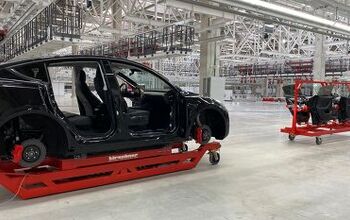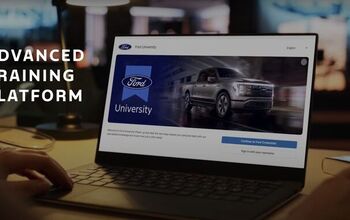BMW Looks to Shed About 6,000 Positions, Ends AV Partnership With Mercedes

Bavaria-based BMW says it aims to cut roughly 6,000 positions from its lineup on account of coronavirus complications. Times are tough and the manufacturer needs to tighten its belt, just like many of its peers.
The alley-oop that precedes the slam dunking of these jobs into the wastebasket will be tempting retirement packages for those of a certain age. But BMW also said it is interested in offering younger people financial assistance for full-time higher education with a guarantee of a job when they’re done — offering some amount of hope.
According to the Associated Press, demand wasn’t anywhere near sufficient to maintain all 126,000 members of BMW’s global workforce. The economic slump that’s presumed to travel in COVID-19’s wake will only further strengthen the industry’s need to cut jobs.
Additionally, BMW announced that it will put its cooperative autonomous vehicle development program with Mercedes-Benz on hold. While stated to be temporary, we doubt you’ll be hearing anything about its reclamation any time soon. Don’t think this is about stoking old rivalries, however. Both automakers have said this is a financial matter complicated by the times in which we live. That’s undoubtedly true, especially since AV development is wildly expensive and seems to have hit a speed bump of late, though there’s always a chance the German duo simply weren’t ready to become best buddies.
Officially, the two companies “arrived at a mutual and amicable agreement to concentrate on their existing development paths.” That includes working with current and/or new partners on the technology. However, both manufacturers want to make it perfectly clear that joint cooperation “may be resumed at a later date and that the two [organizations’] underlying approach to matters such as safety and customer benefits in the field of automated driving remains highly compatible.”
From BMW:
The BMW Group and Mercedes-Benz AG are both working separately on current generations for highly-automated driving and have achieved major progress in this field in the past. However, the BMW Group and Mercedes-Benz AG were unable to hold detailed expert discussions and talk to suppliers about technology roadmaps until the contract was signed last year. In these talks — and after extensive review — both sides concluded that, in view of the expense involved in creating a shared technology platform, as well as current business and economic conditions, the timing is not right for successful implementation of the cooperation.
“We have systematically further developed our technology and scalable platform with partners like Intel, Mobileye, FCA and Ansys,” said Klaus Fröhlich, member of the Board of Management of BMW AG, responsible for Development. “Our current technology generation offers very strong, sustainable potential: With extremely powerful sensors and computing power, our robust modular system puts us in an excellent position to offer our customers what they need for many years.”
[Image: Sklo Studio/Shutterstock]

A staunch consumer advocate tracking industry trends and regulation. Before joining TTAC, Matt spent a decade working for marketing and research firms based in NYC. Clients included several of the world’s largest automakers, global tire brands, and aftermarket part suppliers. Dissatisfied with the corporate world and resentful of having to wear suits everyday, he pivoted to writing about cars. Since then, that man has become an ardent supporter of the right-to-repair movement, been interviewed on the auto industry by national radio broadcasts, driven more rental cars than anyone ever should, participated in amateur rallying events, and received the requisite minimum training as sanctioned by the SCCA. Handy with a wrench, Matt grew up surrounded by Detroit auto workers and managed to get a pizza delivery job before he was legally eligible. He later found himself driving box trucks through Manhattan, guaranteeing future sympathy for actual truckers. He continues to conduct research pertaining to the automotive sector as an independent contractor and has since moved back to his native Michigan, closer to where the cars are born. A contrarian, Matt claims to prefer understeer — stating that front and all-wheel drive vehicles cater best to his driving style.
More by Matt Posky
Latest Car Reviews
Read moreLatest Product Reviews
Read moreRecent Comments
- Zerofoo No, I won't miss this Chevrolet Malibu. It's a completely forgettable car. Who in their right mind would choose this over a V8 powered charger at the rental counter? Even the V6 charger is a far better drive.
- Offbeat Oddity Nope, I won't miss it. I loved the 2008-2012 Malibu, but the subsequent generations couldn't hold a candle to it. I think the Impala was much more compelling at the end.
- Zerofoo An almost 5000 pound hot hatch that fell out of the ugly tree and hit every branch on the way down? No thanks.
- Tassos Jong-iL This would still be a very nice car in North Korea.
- Jeff One less option will be available for an affordable midsize sedan. Not much can be done about GM discontinuing the Malibu. GM, Ford, and Stellantis have been discontinuing cars for the most part to focus on pickups, crossovers, and suvs. Many buyers that don't want trucks or truck like vehicles have moved onto Japanese and South Korean brands. Meanwhile large pickups and suvs continue to pile up on dealer lots with some dealers still adding market adjustments to the stickers. Even Toyota dealers have growing inventories of Tundras and Tacomas.


































Comments
Join the conversation
Maybe they were all working on the defunct i8.
They should lay off all the idiots that are responsible for all the crappy parts they put in their cars; especially some of the plastic engine parts.